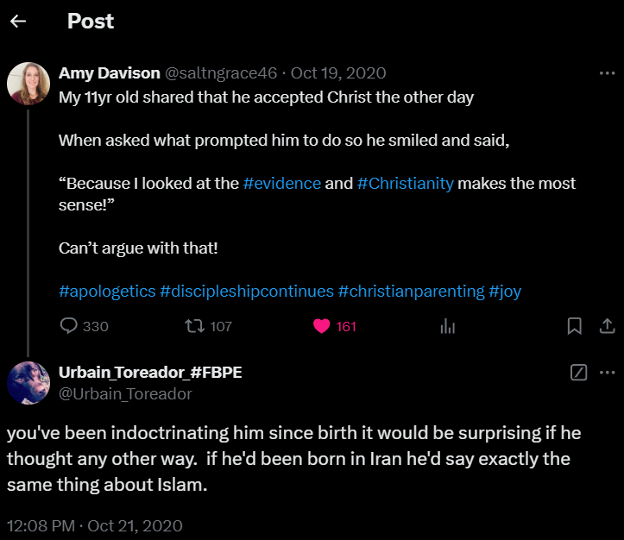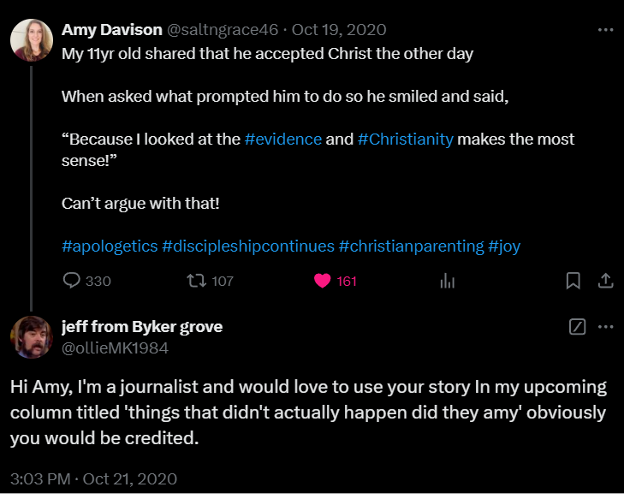For almost a week in late 2020, my 11-year-old son practically went viral on the Internet, and he doesn’t even know it. Let me tell you why. You see, he had walked out onto our back deck and, cool as a cucumber, announced to my husband and me that he had accepted Jesus as his Savior. Needless to say, we were pleasantly caught off guard.

“Oh? When did this happen?” I asked.
“The other night. Yup,” he nodded in a very Young Sheldon-esq way, “I looked at the evidence and Christianity makes the most sense.” Then, away he went to build a new Lego creation.
We had a good chuckle over his matter-of-fact confession. I thought my apologetics friends would, too, so I hopped on Twitter and shared the amusing scene. I didn’t think it would make much of a blip on the social network but mamas. . . Twitter. Lost. Its. Mind.
In just hours, my tweet had 100,000+ views and a torrent of comments. I thought my phone was busted because it wouldn’t stop dinging. The majority of people interacting were split between being furious that he accepted Christ or denying that this even happened.
Here are a couple of examples:


The tweet was even nominated for a “Didn’t Happen In Real Life” Twitter award which, hilariously, is actually a thing. [i]
For those few days, we waffled between amusement and sadness. People weren’t just skeptical, some were downright vile. When Christ said we will be hated because of our belief, He wasn’t kidding.
Making Sense of the Twitter Minefield
As I sorted through the comments, I noticed that most of the hatred revolved around a few main challenges toward Christian parenting. Each have their own valid concern and, sadly, their own wound. Most parents will be accused of at least one of these, but let me encourage you, each can easily be debunked. Ready?
- “Your child isn’t mature enough.”
The first big reason I saw floating amidst the tweets was the claim that kids can’t make a decision about their faith because their brains haven’t fully matured. Had my son said he was pro-choice, anti-Trump, atheist, or identifed as a different gender, these same critics probably wouldn’t have had a problem. [ii] But believe in Jesus? Not a chance.
Had my son said he was pro-choice, anti-Trump, atheist, or identifed as a different gender, these same critics probably wouldn’t have had a problemClick To Tweet
They’re right that children’s brains aren’t fully developed, but they kinda shoot themselves in the foot, too. The human brain isn’t fully formed until around the age of 25. Yet, it continues to develop and sharpen critical reasoning skills for the duration of a person’s life. [iii] When then, is the cognitive finish line? At the very least, this argument would mean that we couldn’t discuss Christianity ’til our kids are middle aged and starting families of their own. Talk about ridiculous.
Secondly, just because a person has reached the age where their brain is developmentally mature, it doesn’t guarantee they’ll make informed sound decisions. I mean, have you been on a college campus lately?! If we’re going to implement standards on when a person is capable of making important decisions like faith, age won’t always cut it.
With this in mind, I agree with the critics to an extent. I get a bit nervous when some adorable little moppet needs water wings to enter the baptismal. Sure, their confession warms the heart, but sometimes I wonder how much they really understand about walking in the Christian faith. Will they stand firm in their youth like Timothy? Or end up like the adult waiting behind them to be rebaptized because they didn’t know what they were getting into at such a young age? It’s not for me to say. What I can say is that the Holy Spirit can move in the young just as much as the old and in-betweens. A child is more than capable of understanding the basics of theology, logic, apologetics, and worldviews to make their own personal informed decision. Sometimes we don’t give the littlest among us enough credit.
- “You’re obviously indoctrinating them.”
Every time I see someone toss out the word indoctrination, my inner Inigo Montoya thinks, “You keep using that word. I do not think it means what you think it means.”And for the most part, Montoya is dead on. Indoctrination means that ideas are taught to be accepted uncritically. You don the robe, drink the Kool-Aid, and don’t you dare ask what’s in it. [iv]
The sad part is that a lot of adults wanting to slam Christians with indoctrination charges are reacting from their own or another’s bad experiences, not because they’ve seen how you run your household. They may have had a parent who would throw a fit if they asked a question. Perhaps a pastor accused them of being sinful for having doubts. Some felt that their family’s love depended on them accepting their parent’s faith. Is it any wonder why they’d be skeptical?
Here’s the thing: just because some kids have been bullied into the faith, doesn’t mean all of them have. If kids are allowed to interact with other worldviews, practice critical thinking, explore challenges to the faith, and decided for themselves if they want to accept Christianity, then they are not being indoctrinated, they’re being educated.
If kids are allowed to interact with other worldviews, practice critical thinking, explore challenges to the faith, and decided for themselves, then they are not being indoctrinated, they’re being educated.Click To Tweet
- “Only atheists are critical thinkers.”
This argument trails closely behind the indoctrination challenge and goes something like this: Only atheists are critical thinkers. Why? Because they’re atheists. Christians couldn’t be critical thinkers because if they were, they would be atheists. If this sounds a bit circular to you, that’s because it is.
A lot of the problem stems from the false belief that to think critically, you have to abide by the rules of naturalism. If any evidence is outside of nature (which is where we get the term supernatural) or if evidence points to God, then it has to be tossed aside because you can’t think critically by using it. [v] Talk about linguistic theft!
Folks, if someone thinks that Christians can’t be critical thinkers simply because they accepted Christianity, then they need to acquaint themselves with the real definition of critical thinking and a few people like Robert Boyle, Isaac Newton, and George Washington Carver. All were great critical thinkers, scientists, and engineers. And all of them were *spoiler alert* Christians!
- “They’re only Christians because you are.”
Let’s cut to the chase. When someone says that a kid is only a Christian because their parents are, they’re committing what’s called the genetic fallacy. Under the genetic fallacy, a belief can be tossed aside based on where it came from. Remember when Nathanael in John 1:46 asked if anything good can come from Nazareth? Yeah, his “if it’s from Nazareth it’s bad,” mindset is an example of a genetic fallacy.
Toss in challenge #3, and your kids couldn’t be Christians because of the working of the Holy Spirit, being taught how to evaluate arguments, seeing the philosophical implications of varying worldviews, or evaluating the evidence for and against God. The only reason your kids are Christians is because you are, and that’s bad . . . . bad logic that is.
If kids are only Christians because their parents are, then there wouldn’t be any Christian parents with Muslim kids or atheist parents with Christian kids. Ironically, when the atheist who tweeted this shared that they had Christian parents, they debunked their own argument. [vi] All parents, regardless of their beliefs, shape their child’s worldview. Ultimately, it’s up to the child what they choose to believe.
The Real Issue
For the grand finale, we welcome Captain Obvious to the stage. The biggest reason folks get their boxers in a bunch over a child’s declaration of faith is because *drumroll please* . . . . they picked Christianity. Mamas, this is no mystery. Jesus said that we will be hated because of His name (Matthew 10:22). This includes our children. Sure, the Twitter haters will use the above challenges to dismiss your child’s confession of faith, but deep down, the real issue is that they hate Christianity. Maybe they’ve been hurt in the past, maybe they’ve bought into our culture’s current view that paints Christians as synonymous with Stalin. Regardless of the reason, if your child is a Christian, they will be seen as either a victim or an enemy. Both for which you are to blame.
Like most Twitter trends, the ruckus over my guy’s confession of faith eventually died down. I didn’t engage with the mob much mainly because arguing on Twitter is a lot like getting into a shouting match with your mailbox. Sure, what you’re saying may be true. But to everyone watching, you look like an idiot. When it comes to social media, you gotta know when it’s pointless to cast your pearls. I write this post to encourage you, mamas and papas, out there to carry on your God-commanded duty to be faithful witnesses to your children. The world may hate you for it, but take heart, you were never meant for this world anyway.
I didn’t engage with the mob much mainly because arguing on Twitter is a lot like getting into a shouting match with your mailbox. Sure, what you’re saying may be true. But to everyone watching, you look like an idiot.Click To Tweet
Ps. If you’re interested in what Tweet caused all the fuss, you can find it on my Twitter page, @saltngrace46. It was posted on October 19, 2020.
References:
[i] I didn’t win (I lost to Britney Spears!), which is kind of a bummer because I was looking forward to wearing a dress made from print outs from the comments section. Just kidding. Kinda.
[ii] I mention these examples because they were actually brought up by people in the comments section.
[iii] A few quick links: https://bigthink.com/videos/what-age-is-brain-fully-developed, https://www.youtube.com/watch?v=OJ_zEaun-as, https://www.businessinsider.com/age-brain-matures-at-everything-2017-11
[iv] Brainwashing kicks things up a notch by throwing some force into the mix. Think The Manchurian Candidate or Peeta from The Hunger Games.
[v] Another big beef the critics had was that my son couldn’t possibly have looked at all the evidence for the faith. They’re right, he didn’t. Neither have I, or you, or them. There’s just too much of it. However, that doesn’t mean you can’t make a rational decision based on what you have.
[vi] There were also some that would proudly claim how their children were fellow atheists while totally missing that they couldn’t stand up to their own charges.
Recommended Resources:
Was Jesus Intolerant? (DVD) and (Mp4 Download) by Dr. Frank Turek
Jesus vs. The Culture by Dr. Frank Turek DVD, Mp4 Download, and Mp3
Can All Religions Be True? mp3 by Frank Turek
How Can Jesus be the Only Way? Mp4, Mp3, and DVD by Frank Turek
Amy Davison is a former Air Force veteran turned Mama Bear Apologist. She graduated from Southwestern Baptist Theological Seminary with an MA in Christian Apologetics. She and her husband Michael (also former Air Force) have been married for over 17 years and have 4 kids. Amy is the Mama Bear resident expert on sex and sexuality, and she’s especially hoping to have that listed on her Mama Bear business card.
Originally posted at: https://bit.ly/4a5exTV


